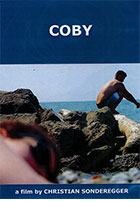
Coby 2017
Distributed by Film Movement
Produced by Moïra Chappedelaine Vautier
Directed by Christian Sonderegger
DVD , color and b&w, 81 min.
High School - General Adult
Family Relations, Gender Identity, Sexuality, Transgenderism
Date Entered: 06/26/2018
Reviewed by Kathleen Spring, Nicholson Library, Linfield College, McMinnville, ORTeenagers in the U.S. spend significant portions of their daily lives online. According to a 2015 Common Sense Media survey, teens use an average of 9 hours of entertainment media per day, and 34% watch online videos daily. Not only are these teens watching online videos regularly, but they are also using public platforms like YouTube to share some very personal aspects of their lives.
In the documentary Coby, we see this played out for one northeast Ohioan as filmmaker Christian Sonderegger’s half-brother documents his transition from female (Suzanna) to male (Jacob, aka “Coby”) via his YouTube channel. Sonderegger weaves interviews with Coby, his girlfriend, parents, and brother with Coby’s transition timeline YouTube videos. In doing so, Sonderegger creates a compelling picture of what it looks, sounds, and feels like to go through the transition process. Neither the filmmaker nor the participants pull any punches – plenty of big issues (parent-child dynamics, romantic and work relationships, the fear/excitement about surgery) are discussed, and Sonderegger treats each topic with respectful care, allowing enough time for viewers to sit with the material.
For Coby, getting used to the way he feels about everything is the hardest part about transitioning. Sonderegger has done a remarkable job of mirroring that process of “getting used to feeling” for viewers. One of the most effective sequences occurs at the very end of the film, when we hear Coby say multiple times (in voiceover) how many weeks along he is in taking testosterone. This chronological audio timeline stands in for the transition process writ large and offers a strong closing to a sensitive portrayal of gender and sexuality.
Coby would be beneficial for both public and academic libraries and is appropriate for courses in gender studies, family studies, psychology, and sociology. A welcome addition to earlier films on transgenderism and gender identity issues such as Gendernauts: A Journey through Shifting Identities (1999) and Becoming Me: The Gender Within (2009), educators might also want to consider pairing it with From This Day Forward (2015) to provide a different generational perspective on the relational aspects of transitioning.